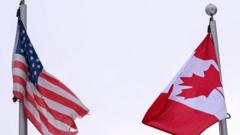The US is on track to impose tariffs on Canada and Mexico as early as Tuesday, with rates to be set by President Trump. Tensions escalate as both nations prepare for possible retaliatory actions, raising the specter of a prolonged trade conflict.
US Tariffs on Canada and Mexico Set for Implementation Amidst Trade Tensions

US Tariffs on Canada and Mexico Set for Implementation Amidst Trade Tensions
Commerce Secretary Howard Lutnick confirms tariffs will begin Tuesday, with potential retaliatory measures from Canada and Mexico.
The United States is poised to impose tariffs on Canada and Mexico starting Tuesday, according to Commerce Secretary Howard Lutnick. These tariffs are part of President Trump's ongoing strategy, aiming to address what he perceives as an influx of illegal drugs and migrants across the US border. Trump has suggested a potential 25% tariff on goods from both neighboring countries, which could significantly impact trade relations.
On the heels of this announcement, Lutnick confirmed that the specifics of the tariffs will be finalized by Trump and his advisors, indicating that negotiations are still ongoing. Additionally, the situation is complicated by a proposed 10% tariff on Chinese imports due to accusations concerning inadequate action against the flow of fentanyl into the US.
Should these tariffs be enacted, Chinese goods could face a cumulative levy of at least 20%, intensifying the already strained economic relationship between the two nations. Chinese media has hinted at reciprocal measures targeting US agricultural products, suggesting that both nations may be bracing for an all-out trade war. Despite the rising tensions, there appears to be a glimmer of hope for negotiation, as analysts believe Beijing may still favor dialogue over confrontation.
In Canada, officials have expressed strong opposition to the potential tariffs, emphasizing that they would adversely affect both economies. Canada's Internal Trade Minister, Anita Anand, recently met with US officials to discuss possible outcomes, asserting that Canada is prepared to defend its economy. Should the tariffs go into effect, Canada has a list ready of $30 billion worth of US goods it could target, ranging from pasta to clothing.
Canadian Prime Minister Justin Trudeau has publicly stated that Canada is not a source of illegal fentanyl, countering US claims that attribute the crisis to cross-border trafficking. Meanwhile, Mexican President Claudia Sheinbaum urged respect in dealing with Mexico and hinted at the need for cooperation rather than subordination to US demands.
In addition to the tariffs on Canada and Mexico, Trump has announced a 25% levy on all steel and aluminum imports set for implementation soon, further adding to the existing tensions in international trade relations. As the situation develops, the complexities of trade policies and geopolitical maneuvers continue to unfold, leaving both allies and adversaries to reassess their strategies in a rapidly changing environment.






















